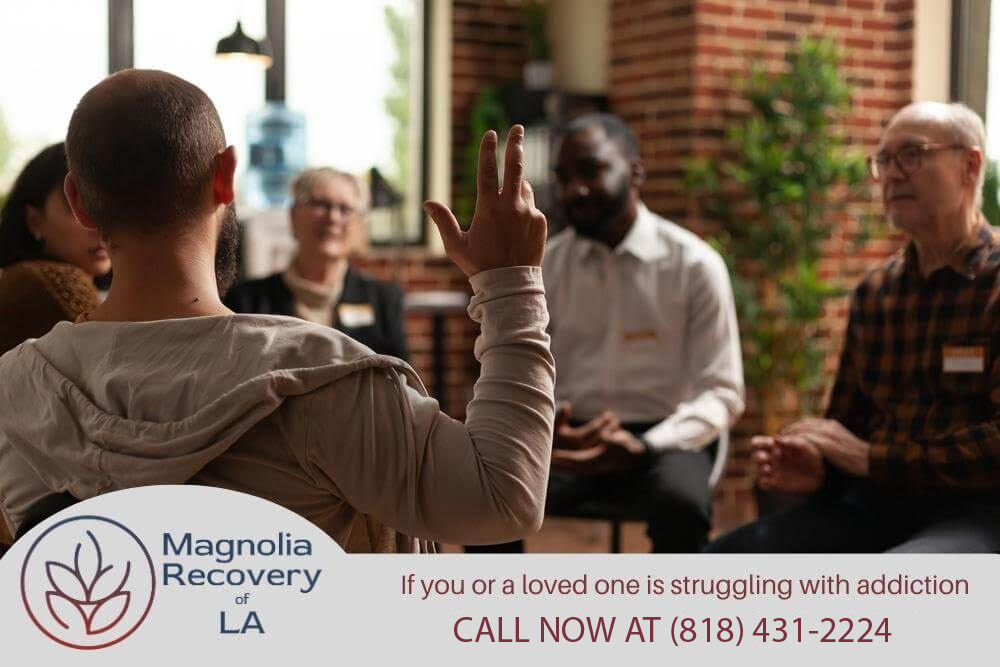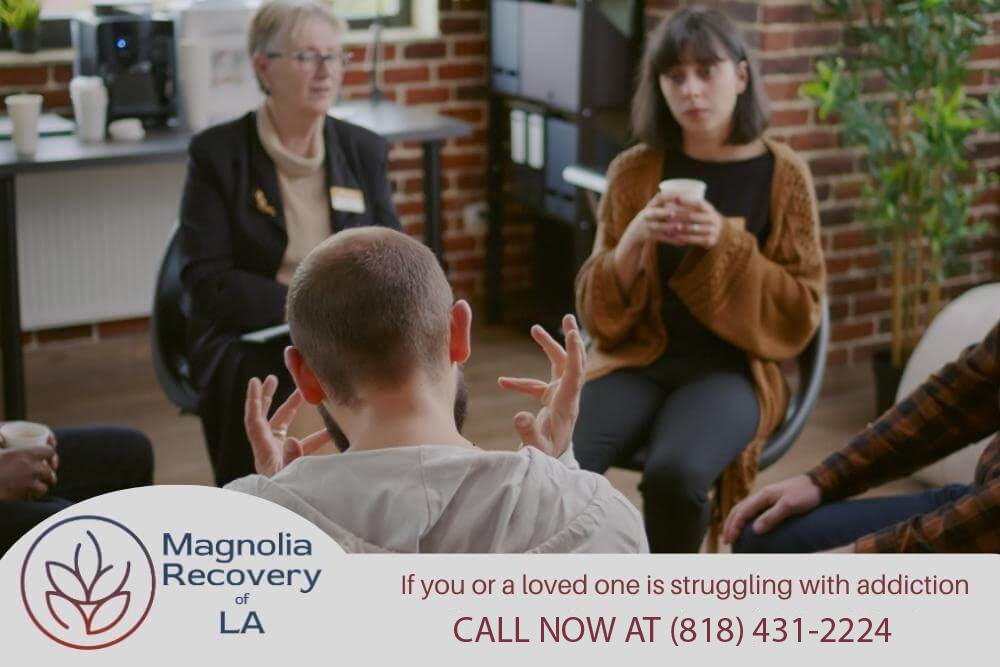Top Rated Residential Drug Rehab Program in Los Angeles
Magnolia Recovery is proud to be among the premier treatment facilities for drug and alcohol addiction in Los Angeles. We offer the best in rehab medicine and therapy, yet you’ll never feel like you’re in a hospital when you stay with us. Keep reading to learn more about our inpatient drug rehab program and how we use evidence-based treatment methods to help you triumph over the disease of addiction.
What Is Inpatient Rehab?
Inpatient rehab is a rehabilitation program where you live and receive treatment at our residential facility. It is the most intensive and thorough of the rehab programs we offer. Our inpatient program is based on standards the Substance Abuse and Mental Health Services Administration (SAMHSA) set out. Your care team at Magnolia Recovery will work with you to help you decide which rehab program suits you best.
Anyone severely dependent on alcohol, opioids, or benzodiazepines must complete a medical detox program before rehab. Supervision is for safety reasons, as withdrawing from these drugs can be life-threatening. You should never attempt to detox on your own. Not only is it highly unpleasant, but it’s also unnecessary suffering. Completing detox at Magnolia means you’ll have 24/7 medical and emotional support and be prescribed medication to keep you comfortable as your body metabolizes the drugs from your system. Detox, on average, takes about a week to complete. There are factors, however, that might extend some symptoms for months.
An inpatient rehab program is an excellent choice for someone with a severe addiction or who has lived with this disease for a long time. Participating in inpatient programs will lower your risk of relapse during these first few weeks or months. Although most physical symptoms stop, emotional symptoms may persist for quite some time. You’ll benefit from the round-the-clock emotional support when staying with Magnolia. Inpatient treatment bridges detox to outpatient treatment, meaning you could complete an initial 30-day program and then move to a program where you go home at night.
What Is Inpatient Drug Rehab Like?
At Magnolia Recovery, you’re never just a number on a case file. Your well-being is important to us, as is that of your loved ones. Our facility is a residential treatment center, not a hospital. It will feel like home to you when you begin treatment with us. Because we are a small, boutique rehab center, we have a high staff-to-patient ratio meaning you’ll receive the best-individualized care. You’ll be safe and comfortable in rehab and find solidarity with those completing rehab with you. You’ll learn a routine and how to practice new, healthy habits under the guidance of expert specialists. You’ll be able to focus entirely on healing with limited outside distractions. When you attend inpatient rehab, you’ll learn how to forgive yourself for past mistakes and let go of any guilt or shame you may still be holding inside.
What to Expect during Residential Rehab
Once you’ve gone through our admissions process, you’ll travel to our facility. If you’re out of state, the Los Angeles and Burbank airports are good to fly into. You’ll have your own bedroom, although sometimes you might have a roommate. We make field trips to beaches, museums, and hiking trails, so pack hiking clothes and swimsuits. We offer fitness and yoga classes, so athletic wear is essential.
You can expect to put a full day into treatment when you begin therapy; recovery from addiction, in the beginning, rehab is very similar to school in that you’re learning many new things and spending entire days practicing those skills. You can relax, watch TV, swim in the pool, or play card and board games in the evening. We encourage clients to take daily walks through the neighborhood as well.
Above all, you can expect to be treated with respect and dignity. Magnolia Recovery is a safe place to heal from the terrible disease of addiction; physically, spiritually, and emotionally.
How Long Does Inpatient Rehab in Los Angeles Last?
This is an excellent question, and the answer is that every person progresses through treatment at their own speed. People who develop a substance use disorder often have co-occurring conditions like PTSD, anxiety, depression, and bipolar disorder. These illnesses also need therapy treatment to be successful. If you have had adverse childhood experiences (ACE), you must unpack those in therapy to re-establish your sense of safety. Over 60% of Americans have experienced at least one ACE; the higher that number, the greater the risk of disease, including addiction. We now know that trauma and mental health disorders are leading factors in those who develop a substance use disorder.
30 Day Rehab
In a 30-day stay at Magnolia Recovery, you can expect to participate in multiple individual therapies and group therapy sessions. Therapists and counselors will administer your treatment with at least a minimum graduate degree in their field of study. Your treatment will include the following therapies.
- Cognitive Behavioral Therapy. A psycho-social intervention that aims to reduce symptoms of various mental health conditions, primarily depression and anxiety disorders.
- Biofeedback therapy
- Dialectical Behavioral Therapy. A modified type of cognitive behavioral therapy (CBT). Its primary goals are to teach people how to live in the moment, develop healthy ways to cope with stress, regulate their emotions, and improve their relationships with others.
- Anger Management. A psycho-therapeutic program for anger prevention and control. It has been described as deploying anger successfully. Anger is often a result of frustration or feeling blocked or thwarted.
- Psychodynamic Therapy. Psychodynamic therapy is based on the psychology of the subconscious mind. This therapy aims to help people recover from addiction by illuminating some subconscious, perhaps repressed, thoughts and emotions behind addictive behavioral patterns.
- Experiential Therapy. This therapy looks different for different people, but it might involve outdoor recreation such as wilderness or rock climbing, music therapy, animal therapy, and art therapy.
- Motivational Enhancement Therapy. It aims to boost motivation by challenging negative thought patterns and replacing them with a concrete recovery plan.
- Holistic Therapy. Holistic therapy considers the client’s overall well-being, including the physical aspects of drug and alcohol withdrawal and mental wellness.
- Cognitive restructuring. The therapeutic process of identifying and challenging negative and irrational thoughts. These sorts of thoughts are called cognitive distortions. Although everyone has some cognitive distortions, having too many is closely linked to mental illnesses such as depression and anxiety.
60 Day Rehab
If you and your care team decide that additional treatment is needed, you’ll complete another 30 days of rehab. Group therapy is proven effective in treating addiction, and community support are essential in recovery. You’ll participate in group therapy sessions like these.
- Daily Goals. A Daily Solution Focused Group focused on assisting you in identifying alternatives to negative patterns or behaviors; you recognize the goal you need to accomplish to succeed. This group focuses on building solutions; while current issues are not ignored, you are encouraged to focus on your desired future.
- Life Skills. Focused on discussing and teaching you the necessary skills to reintegrate into daily life tasks, increasing your sense of self-reliance and independence. This group encourages you to identify and practice the skills to live independently, such as essential skills like cooking food, cleaning your personal space, balancing a personal budget, exercising regularly, eating a healthy diet, and finding work.
- Seeking Safety. A weekly group focused on the Seeking Safety Model, which is an evidence-based treatment for PTSD, substance abuse, and other problem behaviors that stem from emotional dysregulation. With a primary emphasis on establishing safety, the group covers one of several topics that address coping skills relevant to these disorders each week. Some topics include grounding, asking for help, compassion, honesty, and healing from anger.
- 12 Steps Principles. A weekly group dedicated to exploring and discussing the spiritual principles of recovery as guiding principles that correspond to the original 12 steps of 12-step recovery programs.
- Healing through Creativity. A weekly creative expression group focused on exploring how we experience life, pain, and healing by integrating art and creativity.
- Psycho-education. The group focused on receiving education about their disorders and different coping methods. This group utilizes the group therapy process, where people share their concerns and struggles with recovery with the group and facilitator.
- Health and Wellness
- Nutrition Education
- Distress Tolerance Skills. The group focuses on learning the necessary skills concerning tolerating and surviving a crisis and accepting life as it is in the moment, therefore proving impulsive/self-destructive decisions.
- Denial Management. The group focuses on learning how to identify the thoughts, feelings, urges, actions, and social reactions associated with denial patterns, and how these patterns might affect the ability to sustain sobriety.
- Mindfulness. Develop and practice mindfulness skills to learn how to balance emotions and cope with life stresses without reverting to the use of substances.
- Relapse Prevention. A skills-based, cognitive-behavioral approach that requires patients and their clinicians to identify situations that place the person at greater risk for relapse – both internal experiences (e.g., positive thoughts related to substance use or negative thoughts related to sobriety that arise without effort, called “automatic thoughts”) and external cues (e.g., people that the person associates with substance use)
- Emotional Self Regulation. Learning and practicing the ability to manage disruptive emotions and impulses
- Health Awareness. A weekly group facilitated by a medical provider who provides information about HIV, Hep C, Covid-19, Medication Compliance, and other topics.
- Interpersonal Relationships. A group focused on bringing significant changes in interpersonal relationships and developing new strategies to deal with others. You are encouraged to explore how other people’s presence can affect your behavior. The group also discusses how social support and close interpersonal relationships benefit emotional health and happiness.
Rehab programs are sectioned into 30-day periods; some people can complete treatment in this timeframe while others stay for 60 or 90-day periods and beyond. There is no right or wrong length of time in rehab, just what works for you.
90 Day Rehab
At the end of your 60-day stay at Magnolia, you and your care team will assess your progress, and an additional 30 days may be recommended. Extra time in rehab will give you your best chance at recovery. The longer you remain in treatment, the lower your risk of relapse.
Why Choose Magnolia Recovery for Residential Drug Rehab?
We believe treatment for substance use disorders should be affordable, accessible, evidence-based, and personalized. We welcome anyone looking to make changes in their life and work hard to create a safe space for them to do so. Our clinicians and support staff have years of helping people break free from the chains of substance use. We proudly offer an immaculate, bright, and beautiful residential treatment center in sunny California, lounge by the pool, and soak up those rays. Magnolia Recovery offers hope and help to those who need it; know that the power to change is within you. The time for change is now; call us at (818) 431-2224 and take that first step on your road to recovery.


